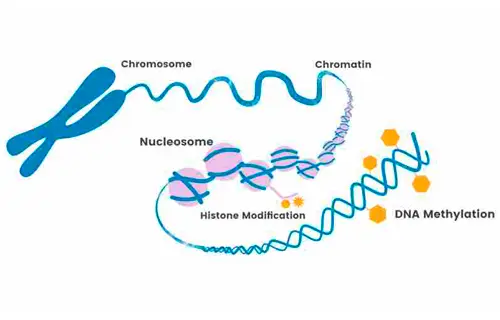CCNB1 cyclin B1

If you tested your DNA with a personal genomics service like 23andMe, AncestryDNA, FamilyTreeDNA, MyHeritage or another testing company, you can learn more about your risk factors for hundreds of diseases. By clicking the button above ⬆️, you can upload your raw DNA data file and receive a personalized 250-page health report with research links that is the most comprehensive.
Cyclin B1 serves as a regulatory protein pivotal in the process of mitosis. It forms complexes with p34 (Cdk1), generating the maturation-promoting factor (MPF). Two distinct transcripts of this gene have been identified: one expressed constitutively and another regulated throughout the cell cycle, primarily during the G2/M phase. The differential expression arises from alternate transcription initiation sites.
Cyclin B1 plays a crucial role in the cell's decision to commit to mitosis, contributing to its switch-like, all-or-none behavior. Its activation undergoes strict regulation, and positive feedback loops ensure sustained activation of the cyclin B1-Cdk1 complex once initiated. This complex participates in early mitotic events, including chromosome condensation, nuclear envelope breakdown, and spindle pole assembly. This gene is anticipated to facilitate various activities, including cyclin-dependent protein serine/threonine kinase activation, enzyme binding, and patched binding. It plays a role upstream or within in utero embryonic development, as well as in the positive regulation of the cell cycle and fibroblast proliferation. The gene is situated in the cytoplasm, membrane, and nucleus, and it coexists with the mitochondrial matrix. It exhibits expression in several anatomical structures, such as the alimentary system, central nervous system, early conceptus, eye, and genitourinary system. In humans, orthologs of this gene are associated with breast cancer and prostate cancer. It shares orthology with human CCNB1 (cyclin B1).
Follow the link of the selected polymorphism to read a brief description of how the selected polymorphism affects Vitamin B1 (thiamine) and see a list of existing studies.
SNP polymorphisms related to the topic Vitamin B1 (thiamine):
| rs7585481 | The breakage results in impairment of the protein's ability to transport thiamine into cells, resulting in decreased absorption of vitamin B1 from food. Thiamine-reactive encephalopathy characterised by seizures responding to high doses of thiamine may develop. |
| rs10933203 | The breakage results in impairment of the protein's ability to transport thiamine into cells, resulting in decreased absorption of vitamin B1 from food. Thiamine-reactive encephalopathy characterised by seizures responding to high doses of thiamine may develop. |
| rs4973216 | The breakage results in impaired ability of the protein to transport folate and thiamine into cells, resulting in reduced absorption of vitamin B1 from food. Thiamine-reactive encephalopathy, characterised by seizures responding to high doses of thiamine, may develop. |
| rs11682956 | The breakage results in impaired ability of the protein to transport folate and thiamine into cells, resulting in reduced absorption of vitamin B1 from food. Thiamine-reactive encephalopathy, characterised by seizures responding to high doses of thiamine, may develop. |
| rs228587 | Associated with the occurrence of childhood encephalopathy due to thiaminpyrophosphokinase deficiency. It is a rare treatable neurological disorder caused by mutations in the TPK1 gene. |
| rs2057868 | Associated with the occurrence of childhood encephalopathy due to thiaminpyrophosphokinase deficiency. It is a rare treatable neurological disorder caused by mutations in the TPK1 gene. |
| rs4725658 | Associated with the occurrence of childhood encephalopathy due to thiaminpyrophosphokinase deficiency. It is a rare treatable neurological disorder caused by mutations in the TPK1 gene. |
| rs4726711 | Associated with the occurrence of childhood encephalopathy due to thiaminpyrophosphokinase deficiency. It is a rare treatable neurological disorder caused by mutations in the TPK1 gene. |
| rs7804157 | Associated with the occurrence of childhood encephalopathy due to thiaminpyrophosphokinase deficiency. It is a rare treatable neurological disorder caused by mutations in the TPK1 gene. |
| rs10274162 | Associated with the occurrence of childhood encephalopathy due to thiaminpyrophosphokinase deficiency. It is a rare treatable neurological disorder caused by mutations in the TPK1 gene. |
| rs13245975 | Associated with the occurrence of childhood encephalopathy due to thiaminpyrophosphokinase deficiency. It is a rare treatable neurological disorder caused by mutations in the TPK1 gene. |
| rs371271054 | Associated with the occurrence of childhood encephalopathy due to thiaminpyrophosphokinase deficiency. It is a rare treatable neurological disorder caused by mutations in the TPK1 gene. |
| rs766420 | A breakdown responsible for the production of the enzyme transketolase, which is involved in the regulation of multiple cancer-related events such as cancer cell proliferation, metastasis, invasion, and resistance to chemoradiation therapy. Indications are high doses of thiamine (vitamin B1), which may normalise the enzyme. |
| rs2239466 | A breakdown responsible for the production of the enzyme transketolase, which is involved in the regulation of multiple cancer-related events such as cancer cell proliferation, metastasis, invasion, and resistance to chemoradiation therapy. Indications are high doses of thiamine (vitamin B1), which may normalise the enzyme. |
| rs4687717 | A breakdown responsible for the production of the enzyme transketolase, which is involved in the regulation of multiple cancer-related events such as cancer cell proliferation, metastasis, invasion, and resistance to chemoradiation therapy. Indications are high doses of thiamine (vitamin B1), which may normalise the enzyme. |
| rs4687718 | A breakdown responsible for the production of the enzyme transketolase, which is involved in the regulation of multiple cancer-related events such as cancer cell proliferation, metastasis, invasion, and resistance to chemoradiation therapy. Indications are high doses of thiamine (vitamin B1), which may normalise the enzyme. |
| rs10126322 | A breakdown responsible for the production of the enzyme transketolase, which is involved in the regulation of multiple cancer-related events such as cancer cell proliferation, metastasis, invasion, and resistance to chemoradiation therapy. Indications are high doses of thiamine (vitamin B1), which may normalise the enzyme. |
| rs11717712 | A breakdown responsible for the production of the enzyme transketolase, which is involved in the regulation of multiple cancer-related events such as cancer cell proliferation, metastasis, invasion, and resistance to chemoradiation therapy. Indications are high doses of thiamine (vitamin B1), which may normalise the enzyme. |
| rs12493802 | A breakdown responsible for the production of the enzyme transketolase, which is involved in the regulation of multiple cancer-related events such as cancer cell proliferation, metastasis, invasion, and resistance to chemoradiation therapy. Indications are high doses of thiamine (vitamin B1), which may normalise the enzyme. |
| rs17336718 | A breakdown responsible for the production of the enzyme transketolase, which is involved in the regulation of multiple cancer-related events such as cancer cell proliferation, metastasis, invasion, and resistance to chemoradiation therapy. Indications are high doses of thiamine (vitamin B1), which may normalise the enzyme. |
About The Author
Li DaliLi Dali, a National Foundation for Outstanding Youth Fund recipient, is a researcher at the School of Life Sciences in East China Normal University. He earned his PhD in genetics from Hunan Normal University in 2007 and conducted collaborative research at Texas A&M University during his doctoral studies. Li Dali and his team have optimized and innovated gene editing technology, leading to the establishment of a world-class system for constructing gene editing disease models.


